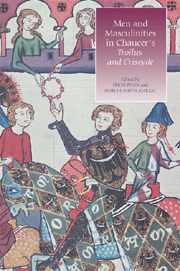Book contents
- Frontmatter
- Contents
- Contributors
- Abbreviations
- Introduction: The Myths of Masculinity in Chaucer's Troilus and Criseyde
- 1 “Beautiful as Troilus”: Richard II, Chaucer's Troilus, and Figures of (Un)Masculinity
- 2 The State of Exception and Sovereign Masculinity in Troilus and Criseyde
- 3 Revisiting Troilus's Faint
- 4 What Makes a Man? Troilus, Hector, and the Masculinities of Courtly love
- 5 Masculinity and Its Hydraulic Semiotics in Chaucer's Troilus and Criseyde
- 6 Masochism, Masculinity, and the Pleasures of Troilus
- 7 “The Dreams in Which I'm Dying”: Sublimation and Unstable Masculinities in Troilus and Criseyde
- 8 “A Mannes Game”: Criseyde's Masculinity in Troilus and Criseyde
- 9 Troilus's Gaze and the Collapse of Masculinity in Romance
- 10 Sutured Looks and Homoeroticism: Reading Troilus and Pandarus Cinematically
- 11 Being a Man in Piers Plowman and Troilus and Criseyde
- 12 “The Monstruosity in Love”: Sexual Division in Chaucer and Shakespeare
- Index
- CHAUCER STUDIES
8 - “A Mannes Game”: Criseyde's Masculinity in Troilus and Criseyde
Published online by Cambridge University Press: 12 September 2012
- Frontmatter
- Contents
- Contributors
- Abbreviations
- Introduction: The Myths of Masculinity in Chaucer's Troilus and Criseyde
- 1 “Beautiful as Troilus”: Richard II, Chaucer's Troilus, and Figures of (Un)Masculinity
- 2 The State of Exception and Sovereign Masculinity in Troilus and Criseyde
- 3 Revisiting Troilus's Faint
- 4 What Makes a Man? Troilus, Hector, and the Masculinities of Courtly love
- 5 Masculinity and Its Hydraulic Semiotics in Chaucer's Troilus and Criseyde
- 6 Masochism, Masculinity, and the Pleasures of Troilus
- 7 “The Dreams in Which I'm Dying”: Sublimation and Unstable Masculinities in Troilus and Criseyde
- 8 “A Mannes Game”: Criseyde's Masculinity in Troilus and Criseyde
- 9 Troilus's Gaze and the Collapse of Masculinity in Romance
- 10 Sutured Looks and Homoeroticism: Reading Troilus and Pandarus Cinematically
- 11 Being a Man in Piers Plowman and Troilus and Criseyde
- 12 “The Monstruosity in Love”: Sexual Division in Chaucer and Shakespeare
- Index
- CHAUCER STUDIES
Summary
In her provocative work Female Masculinity, Judith Halberstam suggests that,
far from being an imitation of maleness, female masculinity actually affords a glimpse of how masculinity is constructed as masculinity. In other words, female masculinities are framed as the rejected scraps of dominant masculinity in order that male masculinity may appear to be the real thing.”
In Troilus and Criseyde, Criseyde performs both traditionally defined femininity – located primarily in her anxiety, her beauty, and her inconstancy – and a female masculinity that shows itself in a series of moves that attempt self-preservation in a world defined by male masculinity's “real thing.” Suggesting that a “widespread indifference to female masculinity … has sustained the complex social structures that wed masculinity to maleness and to power and domination,” Halberstam offers an explanation for the hesitation on critics' part to identify and interrogate Criseyde's masculinity except in light of a perceived “unmanning” of her counterpart Troilus within the contexts of courtly and sexual love. Yet doing so shows Chaucer to anticipate two assumptions of contemporary criticism: that gender is not tied exclusively to sex, and that masculinity (and femininity, of course) is performed multiply as characters move through the contexts he provides. If these multiple performances are ultimately constrained by a normalizing force that concludes his works, Chaucer's own resistance to conclusion suggests an anxiety about the very act of gender restriction required by narrative closure, while simultaneously showing it to be, in Carolyn Dinshaw's words, “a set of assumptions, a catalogue of postures” located not in sex but in a rhetoric of performances and “impersonations.”
- Type
- Chapter
- Information
- Men and Masculinities in Chaucer's 'Troilus and Criseyde' , pp. 115 - 131Publisher: Boydell & BrewerPrint publication year: 2008



